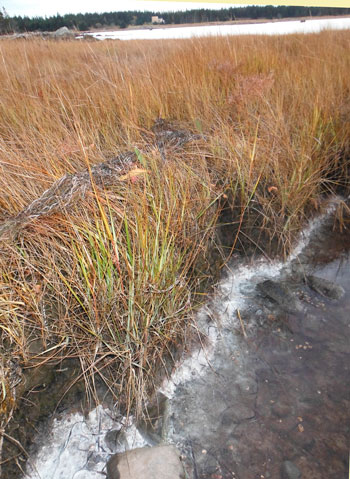L E T T E R S T O T H E E D I T O R
150 Years of Lobster Fishing,
But No Answers

Shoreline of Jordan Bay, Nova Scotia. The white substance in the photo appeared along the shore after finfish feed lots were installed in the bay. Sindy Horncastle photo
Jordan Bay is a small lobster fishing community on the south shore of Nova Scotia. The bay is pristine. The lobster season runs from Nov. to May with shoulder seasons of irish mossing and rock weed harvesting.
We would like to let other fishing communities and fishermen know about some of the changes we began to see in the bay and along the shoreline after the installation of two 100-acre open pen aquaculture sites. We began to see these changes in July 2013, shortly after the sites were stocked.
The photos were taken along the shoreline about 2 km. from one of the sites. Large amounts of a whitish substance began to appear on the shoreline in July. This substance has been tested by a reputable lab. It is mineral oil, which can be used in open pen aquaculture. It has consistently and repeatedly been depositing on the shoreline here since July. The only industrial activity in Jordan Bay is the open pen feedlots. Up until this spring, the bay was pristine.
In addition, only a few weeks after the fish were stocked in Jordan Bay, they required “medications.” Questions about the kind of drugs (pesticides, antibiotics?) and how many times drugs have been administered have gone unanswered by government and industry.
How is it that a fishing community with a 150+ year history of a sustainable, productive lobster fishery cannot get answers from industry or government about what is being dumped in our shared public resource? What effects do “medications” and mineral oil have on lobster, shellfish and other aquatic species, vegetation and ocean habitat ?
Open pen aquaculture and its associated environmental damage and reliance on chemicals is a stark contrast to a healthy lobster fishery in a pristine public resource. An open net cannot contain chemicals, disease or fish and food waste.
Our community is worried about the future of our once pristine bay. We want other communities like ours, that depend on traditional fisheries, to hear about how we are being affected by open pen aquaculture.
Sindy Horncastle
Marilyn Moore
Jordan Bay Community, NS
DMR Again Throws Caution to the Wind with Urchin Fishery
The DMR has once again dropped the ball with the Whiting Bay urchin fishery. How can I say this? The DMR without thought to what 40 urchin draggers would do to Whiting Bay allowed the draggers to fish every Monday in December. While the urchin divers are allowed to dive every Tuesday in December. These 40 draggers repeatedly drag up the bottom of Whiting bay on Monday. The water is so muddy on Tuesday morning that urchin divers could only see one of their feet. Several divers, including myself, called the DMR several weeks ago and tried to get them to change their minds and not put us at risk in this fishery. We are just trying to make a living. If we can’t see, we can’t make money. What’s more we could be seriously injured by getting fouled up in unseen ghost gear on the bottom. One of us could die in this fishery due to mismanagement by the DMR.
It makes no difference to a dragger if they go on Tuesday or Monday. We should have been allowed to fish at least every other Monday. I’m sure the DMR laughs at what I’m saying and calls what they do conservation.
In my opinion the commissioner of the DMR being an appointed position is a mistake. The DMR commissioner should be replaced by either a diver or a fisherman who has worked for a living and has a heart. These are my thoughts, now let’s hear yours, Only by speaking out can we change the minds of the heartless DMR. After all we are just trying to make a living.
Quinton King
Corinth, ME 04427
